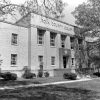calsfoundation@cals.org
Eleanor de la Vergne Doss Risley (1867–1945)
When the Arkansas State Library sponsored an event for supporters in 1939, librarian Vera Snook wrote Eleanor Risley, hoping to entice her to attend. Other honored guests were John Gould Fletcher, Charles J. Finger, and Charles Morrow Wilson. Risley’s inclusion on the list is an indication of the importance attached to her reputation as a nationally recognized Arkansas writer.
Risley’s two novels, The Road to Wildcat: A Tale of Southern Mountaineering (1930) and An Abandoned Orchard (1932), had been published by Little, Brown and Company and were critically well received. Between 1928 and 1931, The Atlantic Monthly magazine published a series of Risley short stories about rural southern mountain life. The May 1931 Atlantic Monthly piece “Drought,” which was set in Arkansas, was included by Vance Randolph in his Ozark Anthology (1940). Risley was featured in several newspaper articles, including an Arkansas Gazette Magazine interview by Keo England, “A Genius in the Hills” (August 7, 1932), and Katharine Murdoch Davis’s Arkansas Gazette series, “Interesting Arkansas People” (March 2, 1941).
The record of Risley’s life is somewhat enigmatic. She was born in Nashville, Tennessee, in 1867 to Phillip Stanton Doss and Anne de la Vergne Doss. A biographical sketch about Risley, written by her cousin Louis Freund in 1983, relates that she spent her growing up years in Brownington, Missouri. Around 1900, she was employed as a social worker in San Francisco. By 1910, she was living in Kansas City, Missouri, and was married to Allan Douglas Risley. Either death or divorce ended the marriage, and Risley moved to property near Nevada, Missouri, that had a large apple orchard. Some accounts say she inherited the orchard, but others that she simply lived there. In any case, she had written of her determination to make the orchard profitable. The experience was the setting for her book, An Abandoned Orchard.
While living at the orchard, Risley met and married a farm labor organizer named Pierre Risley (no relation to Risley’s first husband). Pierre often spelled the name Risely, pronouncing it with a long “I” sound. Pierre was also known as “Peter” or “Billy.”
The Risleys moved to Fairhope, Alabama, in the early 1920s, where they were active in writers groups and projects. Sometime in 1925, Eleanor was diagnosed with a “life-threatening” illness (diabetes). She decided to make the most of her remaining time by outfitting a cart that she and her husband pulled by hand as they walked through the hills of northern Alabama for several months. Risley regained much of her health, although the diabetes eventually caused her to become blind. The cart trek became the subject of her novel, The Road to Wildcat; A Tale of Southern Mountaineering.
Late in 1926, the couple moved to Arkansas, settling near Ink (Polk County). They named their home “Camp de la Vergne” and remained there for eight years. In an undated, unpublished manuscript, “Ink, Arkansas Experience,” Risley remarked, “I had always dreamed of living in a small house down a leafy road in some far away green mountains.” At Camp de la Vergne, her dream came true. She wrote her series of Atlantic Monthly pieces and her two successful novels while living there.
In the depths of the Depression, 1935, the couple was forced by economic necessity to move to Mena (Polk County). Louis Freund visited his cousin in Mena the next year and offered the Risleys the chance to move to Eureka Springs (Carroll County), where Freund and a group of writers and artists had purchased Carrie Nation’s house, “Hatchet Hall.”
The Risleys took an apartment in the hotel-like building, and according to Freund, they became central players in the artistic and literary activities of Eureka Springs. Risley helped other authors with their work and continued to write her own stories and poems, although she had stopped publishing her own works. Increased loss of vision and general failing health limited her activities.
Pierre Risley died in Eureka Springs in 1943. Eleanor Risley died in a Little Rock (Pulaski County) hospital on September 5, 1945, from complications following hip surgery. She is buried in the Odd Fellows Cemetery in Eureka Springs.
For additional information:
Eleanor de la Vergne Doss Risley Papers. Special Collections. University of Arkansas Libraries, Fayetteville, Arkansas.
Louis and Elsie Freund Papers. Special Collections. University of Arkansas Libraries, Fayetteville, Arkansas.
Vertical File. “Eleanor Risley.” Special Collections. University of Arkansas Libraries, Fayetteville, Arkansas.
Ellen Compton
University of Arkansas, Fayetteville
 Arts, Culture, and Entertainment
Arts, Culture, and Entertainment Early Twentieth Century, 1901 through 1940
Early Twentieth Century, 1901 through 1940 Literature and Authors
Literature and Authors Polk County
Polk County The Road to Wildcat
The Road to Wildcat 




Comments
No comments on this entry yet.